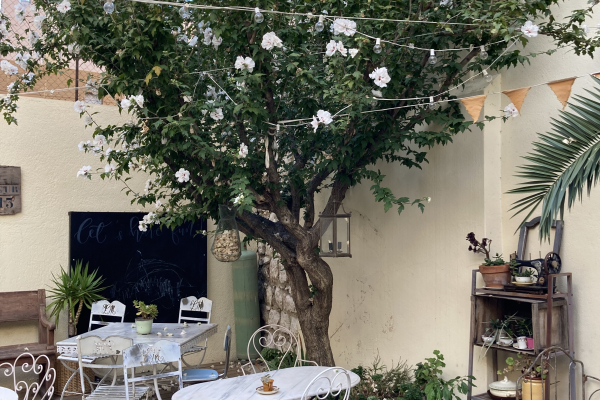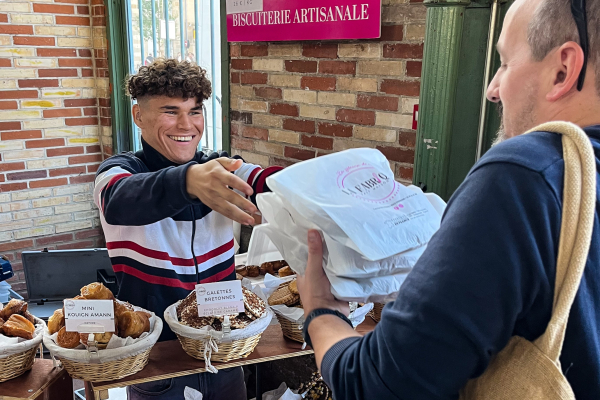Sin, Spatulas, and Spiritual Growth
Is it just me, or do you ever have a hard time admitting when you’re wrong? As someone who has always put enormous pressure on myself to be perfect (hint: it is impossible), I struggle when I realize I’ve messed up. What’s even worse is when I realize that my error has hurt someone else. A recent mistake of mine made me come face to face with my limited understanding of others and my ability to hurt people despite my best intentions to do good. It also helped me come to a deeper appreciation of the diversity of Christ’s body.
One day not too long ago, I was over at a friend’s house and we decided to make pancakes. When I ladled out the first batch of batter, I realized that I did not have a utensil for flipping the pancakes, so I went looking for the right tool. My reasoning went something like this, “A metal spatula is not an option. It’s a non-stick pan and I don’t want to scratch it, so I need something either wood or plastic. This plastic one is probably a bit too big. This wooden scraper is a little on the thick side. Oh…here is a nice thin plastic one! It’s perfect.” I took it and started flipping. Something was not right. I saw white on the bottom of the pan, and something smelled funny. Oh no, the spatula was melting!! I had forgotten one very important criteria - heat resistance. I sheepishly showed the spatula to my friend and apologized for my error. Fortunately for me, I have a gracious friend who forgave me, and who was actually able to file off the end of the spatula so that it could still serve its purpose.
I had excellent intentions when I chose the spatula that I did. From my standpoint, it was the right tool for the job, but I did not take the time to ask the spatula’s owner (because spatulas can’t talk), and my own reasoning failed. It doesn’t matter how much good I wanted to do; I did the opposite. The proof of the melted spatula was irrefutable. In my relationships, I aim to love, encourage and serve. You could say that I have wonderful intentions. The problem is, I do not know everything about the person whom I am trying to love. Depending on how close I am to them, I will know certain things, but I do not know their every thought or feeling. We may even have lived through the same experience, but I cannot assume that they felt exactly like I did about it. I am not them, and I am not God. My perspective is limited. This means that if I do not stop to ask the person in question, or to receive direction from the Holy Spirit, I may end up doing more harm than good by my words and actions, no matter how great the intentions behind them. I am learning that I need to stop acting on assumptions and seek to understand people better if I want to truly love them well.
I am also learning the importance and freedom of recognizing my sinfulness, apologizing and seeking forgiveness. It does not feel good to know that I’ve hurt someone, but admitting it is an important step in the path toward being freed from sin and transformed by God’s power. 1 John 1:8-10 says, “If we claim to be without sin, we deceive ourselves and the truth is not in us. If we confess our sins, he is faithful and just and will forgive us our sins and purify us from all unrighteousness. If we claim we have not sinned, we make him out to be a liar and his word is not in us.” Recognizing my sinfulness is not an enjoyable experience, but until I do, I remain enslaved to it. God knows I am sinful, and His love for me is not dependent on my actions, but the depth of fellowship I can enjoy with Him, or with others, is limited when I deny the fact that I’ve sinned.
Sometimes when I mess up, I feel like all is lost, but when I confess my failures to the Lord, I know I am forgiven. If I have hurt someone, it is also important that I recognize the injustice that I did them and ask their forgiveness. Depending on what it was I did, I know that the relationship will not necessarily be the way it was before, and that it can take time to regain the trust that was lost. I have been blessed with gracious friends who have not held grudges against me, but I can imagine that if I continued to melt spatulas, for example, I would probably no longer be trusted to make pancakes!
In addition to these lessons, this story also illustrates how important living in community is for our individual growth. God uses others to teach, correct, and grow us. As a single who lives alone, I can tend to think that I’m a pretty good person who doesn’t have a lot of relational conflicts, but that’s only when I am not in close and constant contact with other people. The deeper I get in my relationships with others, the more my flaws are exposed. I can choose to focus on the imperfections I see in others, or I can face the truth about myself and allow God to transform me to be more like Him. Melting the spatula exposed a lack of understanding on my part, and showed me something about myself that I would not have known otherwise.
The more I think about this story, the more I realize that it is not simply about sin, but it holds an important truth about Christ’s body, the Church. My friend’s drawer was full of utensils, each designed with a different purpose. Used accordingly, they can help to create a delicious meal. They are diverse yet complementary. If you misuse a utensil like I did however, you run into problems, both for the utensil and for the meal. My friend’s spatula was absolutely perfect for scraping the side of a mixing bowl; it was thin and delicate and never meant to touch a hot pan. I could have blamed it for melting, but that would have been absurd. It’s the same with the Church. Each one of us are members of Christ’s body, created uniquely and beautifully, to serve God and the other members of the body, in order to reflect God to the world. While it’s very true that we have flaws, we also have intentional differences, which are needed to carry out different but complementary roles. Some people are very sensitive, created to complete delicate tasks and showcase God’s artistry and attention to detail. Others are ‘heat resistant,’ able to withstand great amounts of pressure in order to go to the dark places of the world and tear down strongholds. And so forth. The challenge is to recognize and understand each other’s’ God-given differences, and help each other find their place in the Body. Our maker knows. Christ is the one building His Church, so if we take the time to ask and listen, He will show us. And we will stop melting spatulas and make perfectly golden pancakes!






.png)



